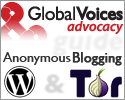The Guide: We recently published an updated version of the Technical Guide to Anonymous Blogging with WordPress and Tor. The Guide is the first of several planned manuals focused on the topics of circumventing internet filtering, secure pseudonymous blogging and effective advocacy through blogs that we are trying to promote as part of the Global Voices Advocacy project. The Anonymous Blogging with Wordpress and Tor guide outlines different methods of protecting one’s online identity in order to avoid retaliation, especially under repressive regimes. The directions outlined in the Guide can considerably reduce the risks that a blogger’s identity will be linked to his or her online writings through technical means.
A linkable, blogging-friendly, HTML version of the guide, illustrated with screen shots, is available here. We have also released the guide as a PDF file. Please link to it and download it and help disseminate this important information. Feel free as well to copy the following HTML code and paste it in your blog:

(click to select, then copy code)
With the collaboration of Tunisian activists from yezzi.org, we are now working on a French version of the guide that will soon be available for download. We are also collaborating with other activists in the field to provide Arabic, Chinese and Vietnamese versions. Please note that the Guide is released under a Creative Commons Attribution license, which means it can be translated freely into a variety of languages. If you believe that your community needs the Guide and that you can help with translating it or with finding volunteers who can do so, please let us know.
The Gallery: Thanks to the involvement of Citizen Lab’s technical research director, Nart Villeneuve, we have launched the National Blockpages Gallery, a collection of screenshots of pages blocked by national filtering systems and Internet service providers. If you are in a country where web sites are being blocked, please send screenshots of the pages to advocacy[at]globalvoicesonline[dot]org, or use the Contact page to send us a link to the image.
The Wiki: This is another important project of Global Voices Advocacy designed to track information related to online anti-censorship efforts throughout the world. The wiki will be used to compile information about the technical, legal and political challenges faced by bloggers, cyberactivists and online writers. By creating a country page (you may use this page as a template to create your country page) or a persecuted blogger page (like this one), you can help raise awareness about activities being undertaken in your community and share best practices, tactics and strategy and raise questions for discussion among the wider community.
The Global Voices Advocacy Wiki will also provide a secure, password-protected online space where people can brainstorm strategies, coordinate activities among bloggers and activists and generally interact online.
The Unfiltered: Is an RSS aggregator of feeds from activist blogs and websites. It keeps track of conversations in the blogosphere relating to online freedom of speech issues. Send us your suggestions for news feeds and we’ll add them to the channel!
 Advox: is the newsletter of Global Voices Advocacy blog. Advox is available free to charge to anyone who subscribes. Our current list of subscribers includes activists, tools developers, experts, bloggers and people who have a general interest in issues of freedom of speech. Subscribe to Advox via this page, and receive regular site updates.
Advox: is the newsletter of Global Voices Advocacy blog. Advox is available free to charge to anyone who subscribes. Our current list of subscribers includes activists, tools developers, experts, bloggers and people who have a general interest in issues of freedom of speech. Subscribe to Advox via this page, and receive regular site updates.
“403 Access Denied Checker”: this early alpha release is a useful piece of software that scans a large number of URLs and finds the ones that your country has banned. The “403 Access Denied Checker”, which was developed by the Tunisian blogger and activist Astrubal, is not a circumvention tool; it was designed, rather, to help activists in nations where censorship takes place to test local blockages.
In addition to these components, which we hope will form a solid foundation for the success of our anti-censorship network, we are also developing strong relationships with some of the key actors in the online anti-censorship and free speech movement, including Tor, the OpenNet Initiative, Amnesty International, NGO-in-a-box and the Electronic Frontier Foundation.
Thanks for reading this quick review of what’s going on at Global Voices Advocacy, and stay tuned for news of a couple of surprises we’re in the process of cooking up!








